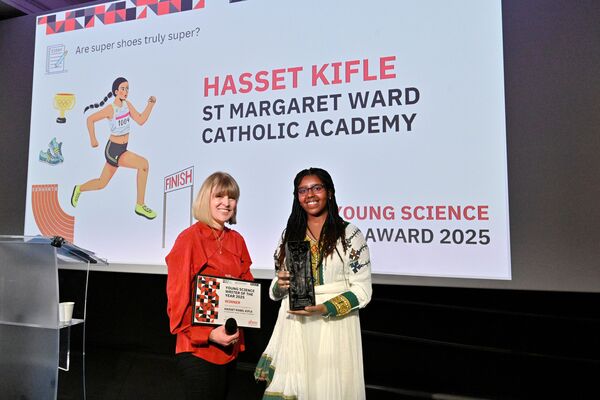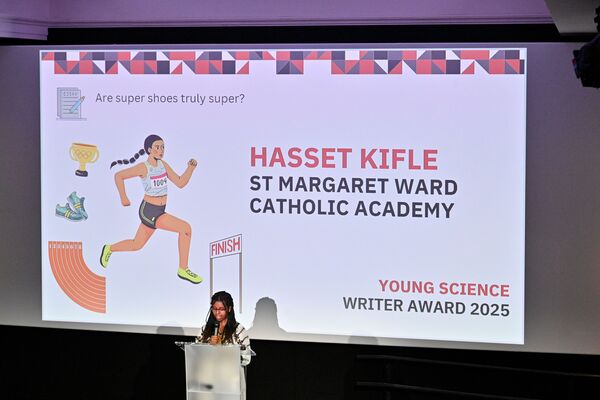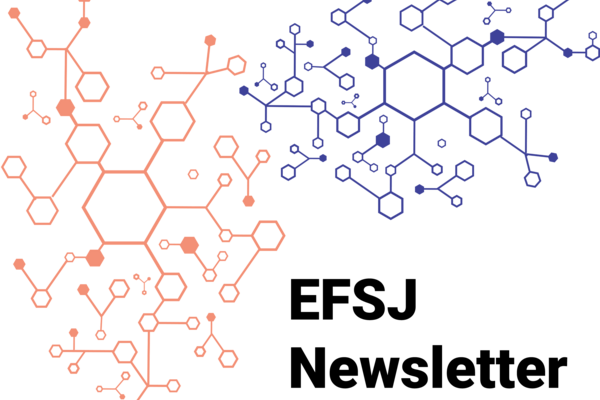Photo credits: Victoria Gil, BBC Science correspondent, handing the award to the winner of YSWA 2025, Hasset Kifle (on the right side of the picture) - Mark Lewis Photography
Hasset Kifle from Stoke on Trent was announced as the winner of the 2025 Young Science Writers Award at an event at the Science Museum in London on Monday 23rd June. She received a prize of £1000, a day at the BBC Science news desk, and a variety of subscriptions, books and stationery.
Hasset used her personal experience as a competitive runner as her starting point for her article about the impact of ‘technological doping’, in the form of super shoes on elite sport. She explained how since shoes such as the Nike Vaporfly 4% were released records have been smashed. The impact of the new design was noticeable when the top three in the marathon at the 2016 Olympics were all wearing them.
But Hasset also questioned the ethics of the super shoes and asked if they are giving unfair advantages to those who can afford them. She asked if there should be ‘separate lists for technology-assisted records’.
Hasset said, ‘I had been fascinated by the shoes and I had asked my coach lots of questions about them before my teacher told me about the competition’. She has just finished her GCSEs and is planning to do Biology, Maths and Product Design for A Levels, a good grounding for designing sportswear. She’s looking forward to getting back to running which has been on hold during her exams.
Over 600 students aged between 14 and 16 at state schools entered the competition. Amongst the winners were young people from all over the UK, from Helston in Cornwall to Moray in the north of Scotland. Roger Highfield, Science Director of the Science Museum and honorary President of the ABSW, told the audience that the entrants had written about their subjects in ‘deeply personal and unexpected ways’.
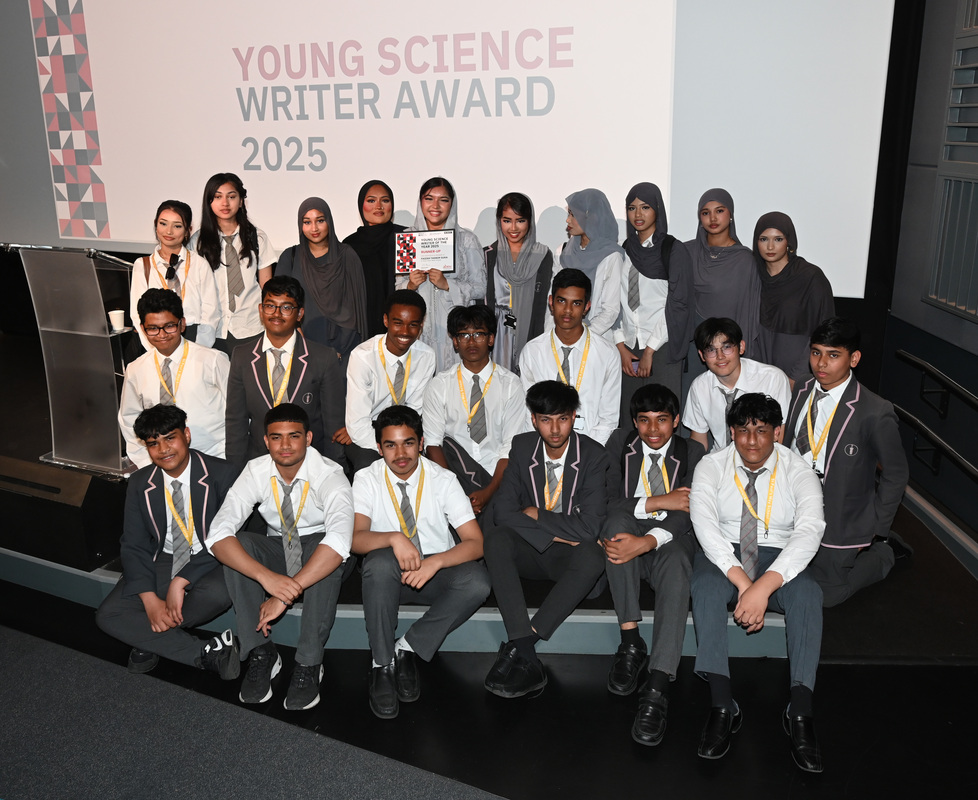
Photo credits: The runner-up Faizah Tasnim Suha (holding the certificate) with her class and teacher, from St Paul's Way Trust School in Tower Hamlets - Mark Lewis Photography
Victoria Gill, BBC science correspondent, handed out the awards and said that the articles by the runners up were ‘really impressive, with the courage to explore big ideas’. One of the runners up, Faizah Tasnim Suha, explored the question Is it a Good Idea to 3D Print the Heart? and decided that in some circumstances it could be. The second runner-up, Pippa Woodley, used her friend’s experience of painful and debilitating endometriosis to raise awareness of this condition, which has no cure and is still not taken seriously by many doctors.
The audience of winners, their families, friends and teachers heard from speakers who told them of their routes into science communication. Dr Jess Wade, physicist at Imperial College, talked about how she got her break when she won the ‘I’m a Scientist get me out of here!’ competition. Some of her advice to budding writers was to know your audience, avoid jargon as good writing should always be easy to read, and find the subject that you’re really passionate about.
Dr Dean Burnett told them how he had found his way from being the only student doing three science A Levels at a comprehensive school in a Welsh valley, via a PhD in neuroscience and the comedy circuit to becoming a best selling author of books on human behaviour. And Hana Ayoob showed how she used drawing to help her understand biology. She loves to talk about the science of everyday life but encouraged the audience to also write about cases where science and technology can be harmful.
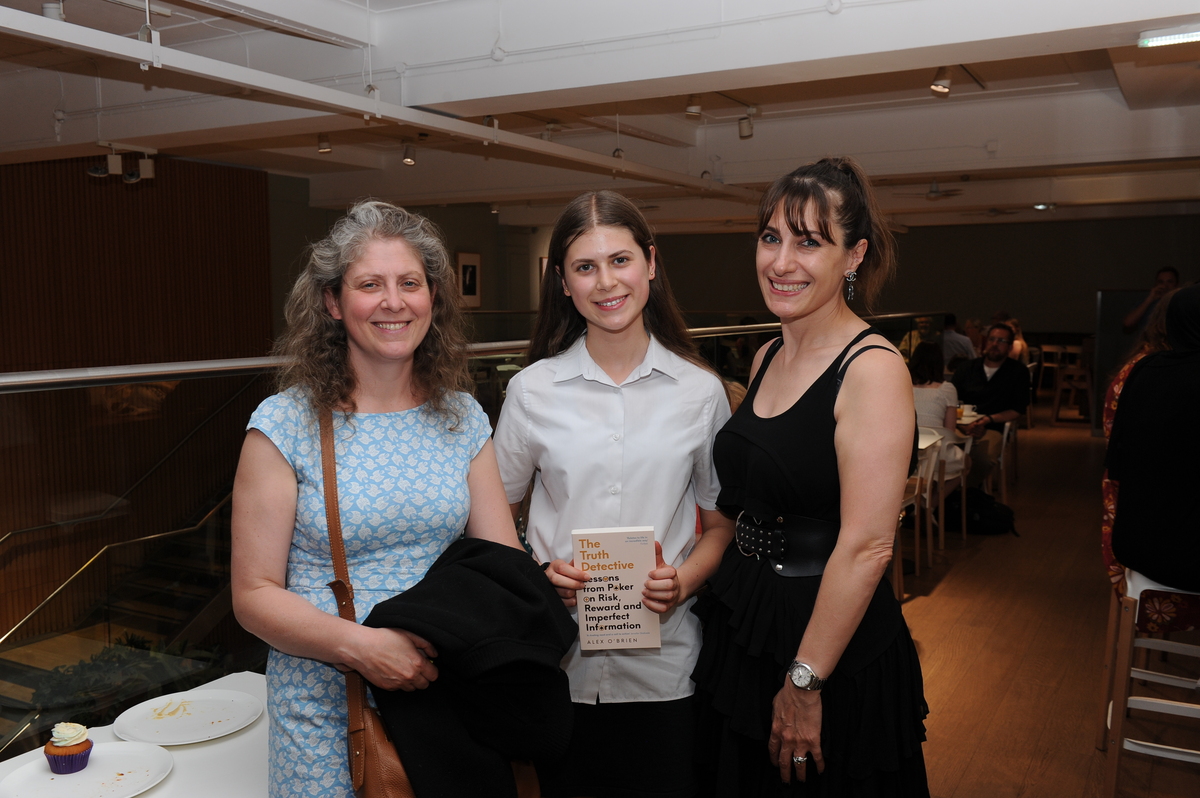
Photo credits: Philippa Woodley, runner up from Ricards Lodge High School in Wimbledon (in the middle), with her mum (on her right) and Alex O'Brien, from the family who sponsors the award - Mark Lewis Photography
The Young Science Writers Award is sponsored by the O’Brien family, with thanks to the BBC, the Royal Institution, the Science Museum, The Week Junior Science+Nature, New Scientist, DK books and Staedtler and Stabilo. In addition to £1000 for the winner, £250 went to the runners-up and £100 to each of the ten who were highly commended. All the winners and runners-up received four DK books, a subscription to the The Week Junior Science+Nature and stationery from Staedtler and Stabilo. The winner and runners-up also got subscriptions to New Scientist and the Royal Institution and signed copies of work by some of the speakers at the event.

